Month 1:15, Week 2:7, Year Day 015
2Exodus 11/40, Chag haMatzah I
Gregorian Calendar: Sunday 14 April 2025
Passover Season 2025 I
The Exodus Story as a Parable,
the Final Gathering & Why Socrates Can't Help

Introduction
Beloved brethren and sisters who aspire to be the faithful servants of El Elyon, the Most High God, our Heavenly Father, Yahweh, who desire with all your souls to be loyal, faithful, trustworthy, diligent and loving servants of our Elohim (God), and to you whose fervent wish is to be a part of the Remnant assembling for the Final Gathering, who want to join the Last Exodus and do as our ancestors did at this time many thousands of years ago when they left Egypt in a prepared rush. I welcome you to this Passover Season!
The Season is Underway
We began yesterday evening with our partaking of the Pesach or Passover Meal in time-honoured fashion, and which we follow on from today for another seven days, this being the first day of Chag haMatazah or Feast of Unleavened Bread, a High and Holy, Set-Apart Sabbath. So shabbat shalom too. And if any of you are new believers and new to this work - many are telling me that they now regard themselves as 'Messianic Evangelical' (with one calling themselves 'Evangelical Messianic'), then I welcome you into the 'strange' world of unfamiliar symbols that you may only have heard of vaguely in your Religious Studies classes at school; and even if you have been gathering year after year to do what you are doing now, the understanding of much of what is going on may very well have passed you by without spiritually registering. If that's the case, don't worry, for just as there is a moment and/or process when a believer is born-again, so it is with our Heavenly Father Yahweh's divine moedim or appointments. There are going to be many moments, if we are fully awake and keenly listening to the Ruach haQodesh (Holy Spirit), of prophetic awakening and revelation to be had, and a drawing closer to our Heavenly Father.
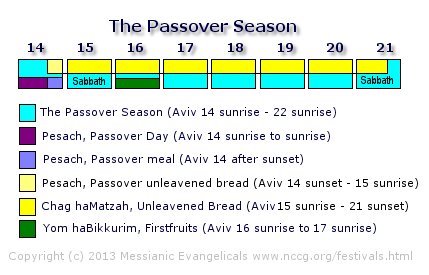
A Story Retold Thousands of Times
So whether you are converts to the Messiah or whether you were raised in the faith in some form or another, you will have read, or heard spoken, or maybe even seen on your TV's or in Hollywood movie theatres, various dramatised portrayals of the first Exodus under Moses. It is a story that has been told - and retold, thousands of times in some form or another. Sometimes this protrayals are heavily embellished, sometimes they're lacking in key information, and sometimes they just get the Bible account plain wrong - because the makers of these productions are various people in various religious traditions and oftentimes they are unbelievers just out to make a box office hit. You may have heard the Exodus story growing up as an Evangelical Christian, or as a Jew, or a Mormon, or a Jehovah's Witness, or a Catholic or as part of any number of different religious traditions.
The Stuff of Adventure
The story of the Exodus, especially when it is told well, is definitely the stuff of children's adventure and delight. People of all faiths or none at all can enjoy the epic. We can receive it as a ripping yarn, a piece of fiction, or myth if you like, or we can receive is as historical fact deeply impregnanted with important, saving truth. We can receive it as literal truth or symbolic truth...or both. And, yes, there is both fantasy or 'fantastic' myth. And what we choose is mostly a mixture of factual events and faith. Only in recent times have we come to learn of the actual geographical location and archaeological site of Mount Sinai at Jabal al Lawz in Saudi Arabia, on the east side of the Gulf of Aqaba, so we have concrete archaeological evidence that all of this was very real indeed. I highly recommend Dr. Lennart Möller's copiously illustrated book, The Exodus Case: New Discoveries of the Historical Exodus [1]. Every Pastor should have a copy of this book.
Understanding Ancient Stories in a Modern World
The best of stories are always credible, and they become more credible because they are true even if, from time to time, 'truth is stranger than fiction'. For the last few centuries, in Europe particularly but now the entire West and world in consequence, has been immersed in the so-called 'Enlightenment' philosophy, a scientific world of scepticism. Now to be fair, science-proper, which is the study of the physical universe, only works through intellectual scepticism. What a minister believes about the physical world (not the invisible spiritual one), unless he is a scientist like myself, is just an opinion, although these days if we have been properly schooled we all ought to have some basic science under our belts. I myself was trained in the scientific mindset as well as in the Socratic Method. What is that? Well, as a Westerner, trained in Western educational establishments (Cranleigh and Oxford), we were taught to think Socratically, as were you, I hope, at least until the rise of the chaos of the fast few decades that is called 'Postmodernism' and its hideous social and cultural manifetation called 'woke-ism'. You may not have heard it called Socratism (most people, in any case, have no idea why they think or believe the way they do) but you are all most definitely a product of it if you have been educated to at least a High School level.
The Western Socratic Method
What do I mean by the Socratic Method? The Socratic Method, originated by the Pagan Greek philosopher, Socrates, is basically just a way of arguing, though a very effective and mostly constructive way. (I am not talking about a verbal fight or scuffle where people are just insulting each other though that's what Wokeism has degenerated into). It is an argumentative dialogue between individuals based on honestly asking and answering questions irrespective of how one might feel about a particular subject. It presupposes we will subdue our passions and focus on purely rational debate. You'll find plenty of examples of Socfratism in the works of another Greek philosopher, Plato, where his teacher Socrates debates various philosophical issues with what's called an 'interlocutor' or 'partner'.
Careful Discipling is Needed Constantly
As a method, then, it is superb for Science and for the making and exercising of law. As I have said, it is the way my generation was trained but it, alas, has become more and more marginal in the broader society where feelings override thinking. Plato had a huge influence on Eastern or Greek thought which in turn was embraced by the Roman world, and in consequence, gradually diffused into the Gospel as it moved west from Israel and into Western Europe by means of a kind of unconscious cultural osmosis as proper discipling became more and more careless and lax. Anyway, the Socratic Method is the way we mostly think in the West and this has influenced how we do theology too; and whilst it has a number of advantages, the result has been to cause much confusion by fragmenting the Body of Christ into tens of thousands of church denominations with new ones popping up every day. By the time Messiah returns, it wouldn't surprise me if we have in excess of 50,000 of them if not millions with every single 'believer' essentially becoming his or her own 'denomination' with his or her 'own truth'.
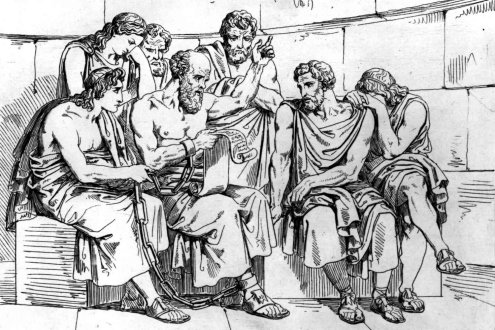 Greek philosopher Socrates' method of arriving at truth by asking lots of questions
Greek philosopher Socrates' method of arriving at truth by asking lots of questions
Fruits of the Tree of Knowledge of Good and Evil
Don't get me wrong, I am very grateful to Socrates, Plato and some of the other great Greek philosophers, though I am less grateful to modern ones like Hegel who took their ideas and methods further and fathered Marxist dialectical materialism which accepts no absolute truth. As a scientist I am truly indebted to them - we all are. But nowhere do you ever find Yah'shua (Jesus) following the Socratic Method. He never taught a School of Debating. And the reason He didn't was because the Truth and Revelation He brought had to be given to mankind in a form where it could never be corrupted or chopped apart by the intellectual mind, even though intellectuals - theologians, philosphers and psychologists particularly - have tried to dissect and analyse the Saviour's teachings. Now you and I have all done this, sometimes to advantage, but mostly, I suspect, not. Were we to have complete access to each other's minds and be in a position to examine them carefully I think we would be, to put it mildly, scared to death. Appalled. And the reason we would react in this way is because what we would see, without necessarily at first realising it (and probably not realising it at all), would be two kinds of 'fruit' coming out of this pagan system of thinking - probably in equal measure - the one good, and the other bad. We would see in each other's minds a mixed bag of good and evil. We would see confusion desperately trying not to be confused. We would see, in short, a working example of the Tree of the Knowledge of Good and Evil in action and its hopelessly jumbled up truths and lies.
 Western Christianity has the philosophy of Plato well and truly mixed in
Western Christianity has the philosophy of Plato well and truly mixed in
Beyond the Human Bio-Computer
Most Westerners view Christianity as a set of intellectual propositions, doctrines or teachings that are either 'true' or 'heretical'. If you 'accept' them with your 'little grey cells', as Poirot would say, and proclaim them with your vibrating larynx, waggling tongue and quivvering lips, you're on your way to heaven. If not, well, chances are you're on your way to the 'other place'... or so they would have you believe. Not that I think that the saved thief on the cross ever had the opportunity to formulate much of anything theological based on what the Saviour told him as there just wasn't time and the conditions were unconducive. Again, please don't get me wrong. I am not against anyone using their brain-boxes, or working out theologies, or doing lots of thinking - good for you if you do! That's part of who we were created to be. Yahweh invites us to use our reasoning processes with Him (Is.1:18) but there are limits (Book of Job). But if that's all you do - try to reason your way into salvation - you're going to end up lost, however brilliant a mind you may have. (Spoiler alert - unsaved intellectuals, like everyone else, possess their own kind of stupidity). And that is because the intellectual faculty, which disintegrates along with our brain at death, is little more than a spongy calculator...an arranger and sorter of information, a bio-computer if you like. And what a fantastic tool it is for earth life! But there is something that is greater than this purely bio-electronic device (incredible a design though it is) and this is what I am aiming to point you to today. Because the way we tell the Passover Story each year will either be intellectually cold, Socratic and sterile, or be alive in vibrant in the Ruach (Spirit).
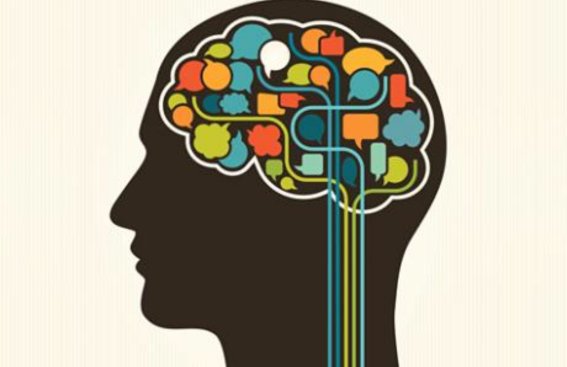 We are blessed with the faculty of reason but
We are blessed with the faculty of reason but
it's not all we have been given & we need more
Parables for the Unregenerated
It surprises many to learn that our Master, Yah'shua the Messiah (Jesus Christ) only ever taught in parables as the way of bridging the gap between the unenlightened masses and the truth-reality of those immersed through Ruach/Spirit baptism in the inner life of the Heavenly Kingdom which He was manifesting outwardly into the world in order to transform our world. He never engaged in Socratic-like debates as Paul once attempted to do in Athens (which, incidentally, he never tried to do again - Acts 17). Rather He engaged His listeners in the traditional and more spiritually effective Hebrew way as we read in the 13th chapter of the Gospel of Matthew, 34th and 35th verses:
"Yah'shua (Jesus) told the crowds all these things (about the Kingdom of Heaven) in parables; without a parable He told them nothing. This was to fulfil what had been spoken through the navi (prophet) [Isaiah] (p.1352, The Evidence Bible):
I will open my mouth to speak in parables;
I will proclaim what has been hidden ('kept secret' - NKJV) from the yesod (foundation) {of the world}"
(Mt.13:34-35, NRSV )
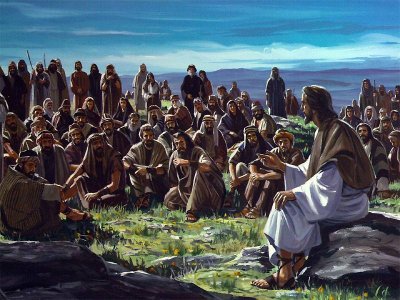 Christ always taught the unregenerated masses in parables
Christ always taught the unregenerated masses in parables
Using Imagery
What is a parable? well, a parable is a narrative or story of imagined events used to typify moral or spiritual relations. Thus in verse 33, which is relevant because today is the Feast of Unleavened bread, Yah'shua (Jesus) taught:
"The Kingdom of Heaven is like yeast (chametz) that a woman took and mixed in with (or 'hid in') three measures of flour until all of its was leavened" (Mt.13:33, NRSV).
And in the two verses before you will recall He likened the Kingdom to a miniscule mustard seed that grew into a mighty tree (vv.31-32). In other words, He used mental pictures or images, the equivalent, I suppose, of an ancient YouTube or Rumble video, only better because these words were directly linked to Yahweh through the Ruach haQodesh (Holy Spirit). I'll explain what I mean by that in a moment.
Hidden from the Foundation
There's something very interesting I need to point out to you about verse 35 before we move on and it's this: whereas most Bible versions like the NKJV include the words "of the world" in the phrase, "I will proclaim what has been hidden since the foundation of the world", some of them do not. Why, you may ask, are these words absent in some manuscripts? Here Socrates can be useful to us. Think about it as I read the shortened version to you:
The Hebrew word here would be yesod but has nothing to do with one of the kabbalistic sephiroth, in case any of you have had a Jewish background in that occultic deviation. Yesod comes from a root meaning 'to establish'. Now, there is nothing wrong with including the expression 'of the world' in this verse but the problem is this: in Hebrew, the word olam can mean many different things, and not simply ones country or even the whole planet earth but also eternity (it can also mean an 'æon' or 'age' [2] too, to make it more complicated - it depends on the context [3]). By dropping 'of the world world' the translator (or editor) may well have wished to emphasise that something bigger than planet earth is in mind, or even the entire creation, visible and invisible. Before Elohim (God) founded anything or created anyone there were, and are, deep truths that can only be accurately expressed through parable-telling which is a kind of prophetic 'forthtelling' language (like inspired preaching) as opposed to the more readily understood prophetic 'future-telling' language.
Echoes of the Psalmist
Many believe that the words of the Saviour are an echo of Psalm 78, verse 2, which reads:
"I will open my mouth in a parable; I will utter dark (mysterious, hidden) sayings from of old" (Ps.78:2, NRSV),
support for which may be found in the ancient Aramaic New Testament which many, like myself, believe is closer to the original than the Greek translations we have, one translation of which reads in English:
"I will open my mouth with a parable. I will utter dark (mysterious, hidden) sayings concerning days of old" (Mt.13:35, HRV).
Dark Depths of Truth & Reality
I dare say that many parables sound 'dark' or 'mysterious' at times to us if we are unfamiliar with them - take the one where Yah'shua (Jesus) taught that no one could be His talmid (disciple) if he would not eat His flesh and drink his blood which obviously was not literal (Jn.6:53-55). Those who didn't 'get' His meaning, or did not have the Ruach (Spirit) with which to interpret it, or lacked the faith to trust Him anyway, got sifted out by means of such testings. Many walked away as you know. This why Yah'shua (Jesus) had to, at times, take the trouble to carefully interpret His 'darker' or 'deeper' parables to His talmidim (disciples) as He did, for instance, with another well°known parable - the parable of the Sower (Mt.13:18-23). You see, these are truths concealed by parables come the foundations of holiness, hence the expression, "I will proclaim what has been hidden from the foundation" and, hence Job's rhetorical question:
"Can you search out the deep things of Elohim (God)?" (Job 11:7, NKJV).
Answer: no (of course).
The Mystery and Nature of Deep Truth
The nature of deep truth and holiness must often be revealed gradulally by means of carefully employed imagery of things familiar to us like, for example, agriculture, but which in the story make no logical, rational sense - in a word, parables must be employed. This is the symbolic 'darkness' in which Yahweh-Elohim lives which the carnal misinterpret to mean that He is evil in some way when of course He is the very opposite. Hence we read:
"The people remained at a distance, while Moses approached the thick darkness where Elohim (God) was" (Ex.20:21, NIV),
darkness which can only be properly understood relatively, just as our loving Him more than our unsaved nearest and dearest can appear like 'hate' to them, and is the hallmark of true talmidim (disciples) for which the world - and the unregenerated, carnal 'believer' - hates us (Lk.14:26-27).
Yahweh is Not the Author of Evil
The same mistake is commonly made in misreading Isaiah, chapter 45 and verse 7 which is badly translated in the King James Version (KJV) to read:
"I form the light, and create darkness: I make peace, and create evil: I Yahweh do all these things" (Is.45:7, KJV).
Yet Elohim (God) cannot possible create evil. Such a notion would make Him both good and evil, but He allows malakim (angels) and men to make their own free choices. A better translation, as in the New International Version (NIV) would be:
"I form the light and create darkness, I bring prosperity and create disaster; I, Yahweh, do all these things" (Is.45:7, NIV).
So I repeat, the darkness which Yahweh lives in has nothing to do with evil. He allows for the possibility of evil by permitting others choose it, but He never chooses it Himself. But He does absolutely judge and punish evil at some point.
The Demand by Yahweh for Holiness
It is this demand for holiness on Yahweh's part which is the reason so many nominal Christians and Messianics hate such things as accountability (like financial stewardship), the kashrut (food) laws, the biblical rules concerning sexual conduct (and therefore Holy Echad Marriage) and indeed so many of Father's mitzvot (commandments). This is why they hate holiness, purity and innocence with a passion and buy in so readily to such lies as 'Once Saved, Always Saved', the idea Yahweh has done all our choosing of heaven or hell for us (Calvinism), the idea we therefore need to be fully submitted to Elohim (God) or wives to their husbands - and so they embrace antinominanism (lawlessness) generally (rejecting Father's Torah). Demons lie behind all of these falsehoods and that's why so many people - nominal believers and unbelievers alike - are often filled with so much rage against those who pursue the truth that stands against such notions. This is one reason we study the Exodus Story because it teaches us about all these things which together amount to that which Father hates the most: idolatry in all its devious and blatant forms. More about that in a minute.
A Type of Parable: Allegory
Let's get back to what I was saying about "the foundation [of haOlam7the world]". The point is - and only is - Yah'shua (Jesus) is pointing us back to a time very, very, very long ago when nearly all external, verbal communication was by means of imagery, and this might be important to bear in mind as we read the oldest book in the Bible, Genesis, not to meantion the last one in the Bible, Revelation, which is very like the beginning of Genesis in so many ways because it is itself jam-packed with a particular kind of parablolic imagery called allegory.
Example of the 'Bride of Christ'
The best example of that, no doubt, is Christ's description of us - collectively - as the 'Bride of Christ' which so many Westerners distort by romanticising our relationship with Messiah as though we were His literal 'wife' as individuals (in fact, a heinous adulterous notion) which is why it is easier for women to 'fall in love' with Christ but not (except very feminised) men, for obvious reasons. This picture is not a picture of our individual but of our corporate or collective relationship with the Messiah! The 'Bride of Christ' is not a literal human being, something the egocetric, individualistic Western mind finds hard not to view it as. The kind of ahavah/chesed/agapé-type love Christ demands of us is much loftier than romantic or sensual eros-type love. The use of the parable, and the allegorical kind of parable in this example, is a comparison only of certain aspects of something literal, tangible and usually visible, namely our own human unions.
 This allegory is supposed to be taken symbolically, not literally,
This allegory is supposed to be taken symbolically, not literally,
and should conjure up an image of our own literal marriages
The Bride of Messiah/Body of Christ Example
Thus we, the born-again, spiritually regenerated, practiced Torah-obedient (Song of Moses), faith-filled (Song of the Lamb) recipients of New Creation, are supposed to be like a true biblical wife - like a fully submitted and obedient wife to her husband - because of the intensity and depth of the emotional, romantic and sexual connection that true earthly, Adamic husbands and wives are supposed to share with without our relationship to Christ being in any literal sense 'romantic' or 'sexual' because our echad union with Messiah is as intense yet not physical. Nothing more. It's of the spirit. Not only that but the imagery, shockingly for Westerners steeped in Romanism, is polygamous too since there is more than one of us who comprise the Body of Christ, more than one of us who is the allegorical 'Bride', who have to learn to cooperatively serve together, like Jacob's family, or Abraham's, or David's, as we are taught in the summer and spring festivals of Messianic Israel. And that isn't at all easy, and often messy, but absolutelly necessary for spiritual growth. That's why we're not allowed to make excuses not to be part of a local assembly or spiritual family. Thus the imagery of the Messianic Bride is a polygamous one like Jacob's, not Isaac's, but scaled up in the allegory because so many millions are saved. Go figure. It's not a hard equation to solve. Do you yet see what it's all pointing to? Collective salvation, not mere 1-to-1 and that's why we have to learn to get on, and thrive, with many. It's a big Family!
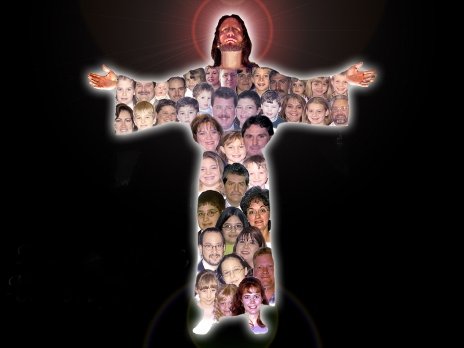 The Body of Christ can only be explained by means of allegory
The Body of Christ can only be explained by means of allegory
The Brain Isn't the Main Thing
My whole point is really very, very simple: though Yahweh gave us brains with which to think and theologise and try to summarise our beliefs, it's a tool for use on earth but still not the 'main thing', especially in evangelism and especially not where life itself is concerned. Now I know there are incredible evangelists and apologists out there with amazing brains who do a fantastic job in preparing the mental soil of unbelievers but the heart-soul, which is where it becomes personal and deep, comes about not through preaching comparitive or systematic theology (something, as you know, which I have been heavily engaged for decades, in order to prepare the Western mind clogged up with intellectualism for which He gave me a very special training as a scientist and latterly amateur historian and theologian) but through the telling of parables and stories. The best preaching is always through parables and stories because that's what comes most naturally to all of us, brain-smart or otherwise. Yah'shua (Jesus) was very intelligent, of course, but he preached simply, something I am not so smart at!
Romancing the Soul
Think of all this ideal Way as being like a romance. You see, if you try to teach a divine truth only outside the story line of a parable, you end up sterilising it, something which we as scientists have a nasry habit of doing sometimes because we are reductionists! The trouble is the whole, as far as the Gospel is concerned, is far greater than the sum of all its parts. Many years ago I was counselling a Messianic Rabbi who was interested in marrying a girl but wasn't getting very far romancing her. It turns out he was trying to attract her by means of his theological knowledge. 'Surely she'd perfer to be married to a Rabbi!' he said to me. 'Brother,' I said to him, 'when your future wife wakes up in bed the next morning she isn't going to expect you to preach her a sermon between the bedsheets or give her the benefit of your deep theological understanding whilst in eager romantic embrace.' That's right, the use of parables is like a romance when you wake up in bed with your bride the following morning that leads to intimacies that conceive new spiritual realities, but not literally so (not like the charismatics who, using occult techniques, try to manifest or materialise things in physical space through the spoken word, naming and claiming this or that). You get the point, I hope. (By the way, that Messianic Rabbi never did 'get' it). You see, we win people by 'romancing the soul', not bombarding it with deep, well-sytructured Wikipedia-like theological information. It comes from the heart, not the neuronal connections in your cranium. (Maybe I'm shooting myself in the foot saying all this?)
 Spiritual truth is conceived by romancing the soul
Spiritual truth is conceived by romancing the soul
The Gift of Imagination
Do you know why Heavenly Father bequeathed you with the gift of imagination? Do you know what it's for? It's for processing and generating images and sounds for the most part, but under the direction of a script, conscious or unconscious. When Yahweh gave us the Scriptures they were supposed to be read out aloud (anciently they were memorised) and the listeners would form images in their minds as they listened and so absorb the story. The listeners didn't make written notes as so many do in church meetings today, when the Pastor is preaching or the Sunday School Class Teacher is teaching, because most were illiterate in those days, couldn't have afforded the paper and ink, and wouldn't have wanted to write it down anyway. We do the same thing when we read books or read love-letters from suitors or spouses. As such, then, the imagination is tailor-made for parables and eminently suited for allegory and the abstract. If you want a biblical example of a romancing 'letter', read the Song of Solomon which is rich in allegorical imagery, and written like a play. This was when receiving the Davar (Word) was the main 'thing' before literacy became universal, and still is in certain parts of the world. It is, moreover, a facet of chayim or life itself - it's there, like a ready-made apparatus, completely invisible to the eye and made of spirit. It's part of our persona. But it's there and it's alive. Subverting the imagination has therefore become one of the Enemy's many urgent projects.
The Movie-Makers Hijack Your Imagination
We can easily forget that near universal literacy is a fairly modern thing and came about more out of functional need than anything else. Today we live in an 'information age' and so literacy is paramount to succeeding unless you totally disappear into the wilderness without 'modern conveniences' of any kind. And wonderful though literacy is in so many ways, it comes with a potential downside. Fewer and fewer people read now and given a choice most will choose to listen or watch something on TV or online because it's easier. Yet did you know that studies have demonstrated that reading is linked to IQ and quite independently of any other factors, including genetics? Those who read from when they are small and continue reading hardcopy books consistently have higher IQs than those who don't, including those who soak up the Internet. When most do the latter, they often turn off both critical reasoning and imagination by quickly entering a passive state and become data non-differentiating, non-sifting spongues. They take the whole lot onboard. What a clever way to sneak in a few lies in a presentation containing truth? When you watch a movie as opposed to reading the Bible, for instance, you're getting someone else's imagination, and therefore interpretation, fed to you passively. I don't know if you have noticed or not, but some parts of the Bible are extremely difficult, if not impossible, to translate into a movie, and are best left unsketched and unfilmed.
The Word as Sculptor
Again, I don't want you to get me wrong. I am not saying that all movies or videos are either bad or harmful to the imagination. Indeed, they can spark further imagination, depending how conscious or lazy you are. As with so many things in life, there are balances we must work out, not an easy thing but something we should learn to intelligently navigate early on. But some truths were designed to be received and processed through hearing and reading the Word - the Davar or Logos - and you will notice from the opening of John's Gospel that the Word existed before any image or picture. We are ourselves living, multi-dimensional images of the Creator Himself, albeit it on a lower plane as mortals and unable therefore to rival Him. We were sculpted by His Word, who on the personal level is Messiah Himself but in the abstract is an active principle impregnating and ordering everything. 'Word' comes before 'Image' when you read a book, just like Creation itself. Yet more and more is being translated to moving imagary now (movies, videos) and this is contributing to a plague or totally avoidable illiteracy, thus lending greater possibility to the corruption of the Word, the Bible. For as we know, the philosophies and doctrines of men creep into many translations.
The First New Testament Letter Readers Were Listeners Too
There's a reason Father has given us written Bibles to struggle with because we can only understand them by using our imagination. As you know, I both read and listen to my Bible in book format and on tape. There's a huge difference in the way we perceived the written and the spoken word. The Word is supposed to shape the imagery, the imagery is what we take and transform into the physical. In New Testament times the bearer of an epistle would listen to the apostle reading it out loud before departure so when he came to read it out loud to a distant congregation, for instance, he would still 'hear' the apostles words whilst reading them. When I am reading an author of theology like N.T.Wright, for example, I consciously 'hear' his own voice which I have heard on videos as I read and this connects me more deeply to what he is personally trying to communicate.
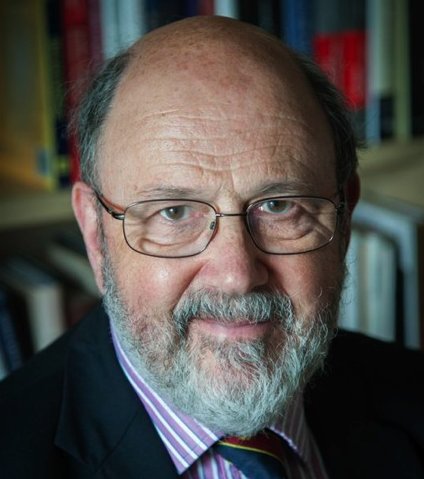 I often 'see' and 'hear' N.T.Wright when I am reading a book of his
I often 'see' and 'hear' N.T.Wright when I am reading a book of his
The Cell as a Translator
Parables begin as words which are then translated, a bit like the ribosomes in a cell taking messenger-RNA which has been transcribed off regular DNA and using that as a template for protein synthesis. Cells come into existence and are replicated by this process from DNA (which is the CODE or the WORD of our physical being proving, incidentally, that were designed and not evolved). Do you follow what I'm saying? By doing the 'translation' himself, man makes mistakes and confounds; and when Satan uses his human agents to 'translate' into images and sound, he is giving one interpretation only - or at best two - his and the human agent's. Thus the TV and Internet are important tools can be used to control the mind without anyone realising it. Again, that's not to say they are of no use and 100 per cent dangerous but rather they are easily subverted tools that can be used to misinform and enslave - a 'Matrix' of illusion. They should therefore be used wisely after we have learned to read and story-tell.
When Concert Soloists Reinterpret Music
Yahweh has commanded us to engage in story-telling and to tell His story using our senses of hearing and seeing along with our faculty to imagine in order to construct a 'full' picture. If you are a classical musical connoisseur you will likely know that no single piece of classical music is ever played identically by musicians, whether by soloists or orchestras. Some of the more risqué ones, like the late concert pianist Vladimir Horowitz (whose rendering of Schubert is out of this world), add their own notes to set pieces sometimes, change the tempo and texture, and so on, and all to the delight of their audiences. Some composers borrow melodies from other composers and rearrange them completely while sticking to the original theme. Mozart did this with a harpsichord tune written by Salieri and created his own concerto out of it, a common practice in those days that was regarded as complimentary or flattering. People take my writings and rewrite them in their own words sometimes, hopefully improving upon them (not always). So long as we have the original blueprint, and acknowledge the original, that's OK. When we tell Bible stories in our own words, we do that.
We All Paraphrase
When one Bible writer paraphrases another, as Paul often did, we do that too. Indeed, that is how revelation is expanded conceptually, like the Olive Branch, something many have criticised me for, thinking I have somehow dessicrated the Word. Yet everyone does it. We plant what we hear or read in the soil of our own hearts - in our imaginations - and if we are submitted to Yahweh, He can then cause it to grow and develop further tailor made to 'our shape', as it were. If He isn't in control, then the result can be a disaster. But that risk is within the purview of our free agency so unless anyone be tempted to abuse that agency, we need to remember we are always held accountable.
Keep the Old Ways Alive and Thriving
I suppose what I am trying to say is that the loss of reading and creative imagination are amongst the chief casualties of our digital revolution and we must not forget to keep the 'old ways' alive and thriving or we will lose something irreplacable, not least our own ability to hear the Ruach (Spirit). Yah'shua (Jesus) clearly commended the true Torah-teacher (Scribe) when He said:
"...every teacher of the Torah (Law, Teaching) who has been instructed about the kingdom of heaven is like the owner of a house who brings out of his storeroom new treasures as well as old" (Mt.13:52, NIV).
Bring out the new but never forget the old because these are tried and tested and connect us to all the previous generations who are also to be a part of the millennial world we share. It's not just about 'us'.
Telling the Passover and Exodus Story Every Year
Now as I hinted at earlier, not all stories are parables, but all parables are most definitely stories. Moses' "In the beginning Elohim (God) created [everything externally]..." of Genesis 1:1, or 'Once upon a time', set a precedent for others, like John's "In the beginning was the Word [even before everything was created externally]..." (Jn.1:1) and that 'Word' or Davar or Logos was the pre-incarnate Messiah, Yah'shua (Jesus), who was incarnated as a human baby, which we celebrated at Aviv 1 two weeks ago (see The Birth of Christ, Tharbis
& the Remnant Bride), and here we are again celebrating the Passover Season. How are we doing it...or rather, how are we supposed to be doing it? The way Father said, by re-telling the story in the same way our future descendants will tell the story of their own experience of the Second, Final or Last Exodus that's been gathering steam now for 11 years already. There are our own children who will experience this adventure after we of my generation have left the world. They will gather for seven years in 12 distinct isolated but glorious communities around the world, and finally they will journey to the Promised Land just before, or just as, Messiah returns, to be caught up into the air as His 'welcoming home' committee to inaugurate the Millennium. What a time that will be!
The Exodus Story Contains Foundational Spiritual Principles
This means that the Exodus story is very important to us and our children because although the Second Exodus will be very different externally and circumstantially from the days of Moses (we'll becoming out of all the nations of the world, not just Egypt, and it'll be a modern 21st century experience and not an ancient one from from 3,500 years ago), the governing salvational principles will be exactly the same. They are the very principles that saturate the New Testament itself which is itself an 'Exodus Story' - a journey out of sin and into the liberty of the redeemed through trusting in, and following, the Son of Elohim (God). The Exodus Story is a detailed road map that shows us just how mankind's deliverance from the world - from demonic bondage, from sinful habits, from lawlessness and so on - is to be accomplished. I plan, if I am well enough, to have a teaching session [4] on this during Passover Season, but to whet your appetites I am leaving you a chart which summarises the important gospel ideas embedded in the Exodus Story which Yahweh gave me in an important revelation while I was evangelising in the United States a couple of decades ago. Some of you will remember this, and one person in particular as they were going through a real life deliverance at the time. I am quite sure you will find it illuminating and helpful in your gospel walk for it is not just about a Person - Yah'shua (Jesus) - but about Torah-Walk (Way or Derech) and Truth and Life (Chayyim) itself:
"I am the Way (Derech) and the Truth (Emet) and the Life (Chayyim). No one comes to the Father except through Me" (John 14:6, NIV).
And so we have much to learn from the past.
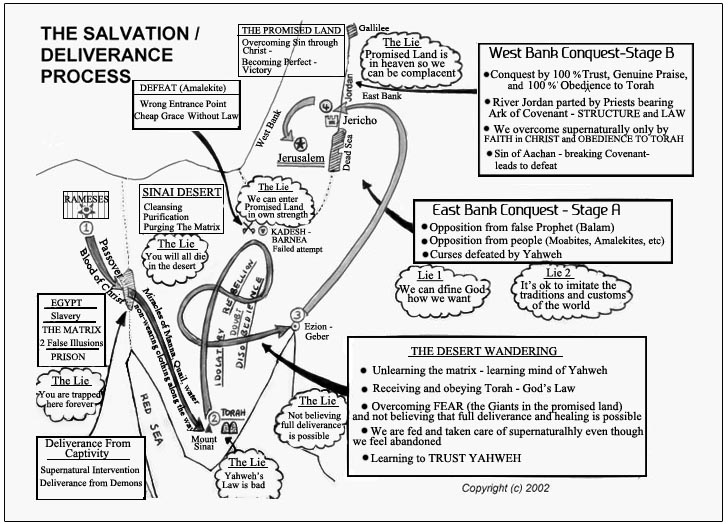
Chag haMatzah
This second of three spring moedim or appointments - the present one being the week-long Chag haMatzah or Feast of Unleavened Bread (bread free of natural yeast) - is especially important because of what it is symbolically pointing us all to. It is almost, moreover, universally neglected even by Christians who are curious about the Passover Meal, who in many cases have been tricked into believing the 'Once Saved, Always Saved' lie. They see no reason for the need to proactively purify their lives, believe there is no need for any kind of life of repentance in dealing with ongoing sin, have no intention of obeying all (let alone most) of Heavenly Father's mitzvot (commandments), do not wish to make any sort of effort to work out their salvation in fear and trembling (notice Paul uses the word "work" in Philippians 2:12) or learn what true, have no wish to deeply surrender or submit their lives to Elohim (God), let alone know what this actually consists of because they have been so poorly discipled by their churches. And yet Yahweh makes the importance of all these things clear by setting apart seven whole days for His people to seriously dwell on these things and to start the new year by reordering their lives and getting back on track. He wants us to understand just how dangerous it is to neglect the pursuit of holiness by conscientiously getting the leaven of sin out of our lives. Because the way we live out the Kingdom life is in a way our announcing in advance how we want to spend eternity. We're saying, this is how we want to be and these are the kind of people we want to spend forever with. And He'll basically give us what we want though perhaps not in the way we expected. He prevents no one from choosing a lesser glory ot even choosing hell.
Conclusion
I think it is a wonderful thing that more and more Evangelical Christians are sitting down with messianics and eating a Passover Meal together. However, the sacred meal we shared last night is 'merely' the introduction to all the other six moedim! Partaking of the seder but not observing any of the other festivals is a bit like attending a wedding supper without attending the wedding itself, getting the bride and bridegroom a present or congratulating them after they have tied the knot. In many ways, it's a bit like gate-crashing a party if your intention isn't to follow through and 'do the lot'. We never invite anyone to attend our Passover dinner simply to satisfy their curiosity. It's only for committed believers who want to learn more and follow Christ faithfully. It is, after all, the Master's or Lord's Supper. It's a sacred meal for faithful talmidim wherever they are on their spiritual journey. It is an invitation to walk with Christ in ongoing faith and obedience. It leads to a celebration of the Resurrection on the second day of Chag haMatzah and to Covenants of Torah-obedience at Shavu'ot in the summer. At each stage the Bridegroom rewards His faithful Bride with new endowments of the Ruach haQodesh (Holy Spirit) and offers her deper communion with Him as she willingly surrenders her life to Him more and more. This is a literal, spiritual journey, a spiritual Trans-Siberian Express of sorts that takes us across a whole continent of earth-life and into the Resurrection Kingdom to come. It's a Story, yet more than a story. It's a living experience beginning with individuals and ending with a vibrant Community called Messianic Israel. It may look on the surface as simply an outer ritual which one can casually join but it's so much more. It's a Derech - a Way - it's the Way in Messiah. I do hope you'll accpot our invitation to join with us and share this journey together. In Yah'shua's (Jesus') Name, Amen.
Continued in Part 2 (Yom haBikkurim)
Endnotes
[1] Dr. Lennart Möller, The Exodus Case: New Discoveries of the Historical Exodus, 3rd extended edition (Scandinavia Publishing House, Strängnäs, Sweden: 2012)
[2] See our website on biblical or Æonian Time
[3] We can't know for sure whether the original contained 'of the world' and this was dropped later by an editor, or whether the original did not contain 'of thre world' and an editor later added that - statistically the former is probably the most likely
[4] See the shorter teaching, A Model for Deliverance: The Exodus

 V483
V483
|


